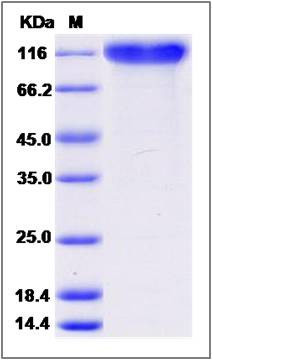Mouse SELP / selectin P / P-selectin Protein (His Tag)
CD62P,GMP-140,Grmp,LECAM3,PADGEM
- 100ug (NPP2788) Please inquiry
| Catalog Number | P50737-M08H |
|---|---|
| Organism Species | Mouse |
| Host | Human Cells |
| Synonyms | CD62P,GMP-140,Grmp,LECAM3,PADGEM |
| Molecular Weight | The recombinant mouse SELP comprises 679 amino acids and has a predicted molecular mass of 74 kDa. The apparent molecular mass of the protein is approximately 116 kDa in SDS-PAGE under reducing conditions. |
| predicted N | Trp 42 |
| SDS-PAGE |  |
| Purity | > 95 % as determined by SDS-PAGE |
| Protein Construction | A DNA sequence encoding the mouse SELP (Q01102) (Met1-Ala709) was expressed with a C-terminal polyhistidine tag. |
| Bio-activity | Measured by the ability of the immobilized protein to support the adhesion of U937 cells. When 5 x 10E4 cells/well are added to SELP-coated plates (1 μg/mL and 100 μL/well), approximately >85% cells will adhere specifically after 60 minutes at 37℃. |
| Research Area | Immunology |Signal Transduction |Cytoskeleton / ECM |Cell Adhesion |Lectin |C-tyep lectin | |
| Formulation | Lyophilized from sterile PBS, pH 7.4. 1. Normally 5 % - 8 % trehalose, mannitol and 0.01% Tween80 are added as protectants before lyophilization. Specific concentrations are included in the hardcopy of COA. |
| Background | P selectin (SELP) is a 140kDa protein that is stored in the alpha-granules of platelets and Weibel-Palade bodies of endothelial cells. SELP mediates rapid rolling of leukocyte rolling over vascular surfaces during the initial steps in inflammation through interaction with PSGL1. P selectin is a cell adhesion molecule on the surface of activated endothelial cells. Cellular adhesion molecules are a large family of proteins that attach the cytoskeleton and intracellular signaling cascades with the extracellular environment. SELP is a calcium-dependent receptor for myeloid cells that binds to sialylated forms of Lewis blood group carbohydrate antigens on neutrophils and monocytes. This protein redistributes to the plasma membrane during platelet activation and degranulation and mediates the interacton of activated endothelial cells or platelets with leukocytes. |
| Reference |
